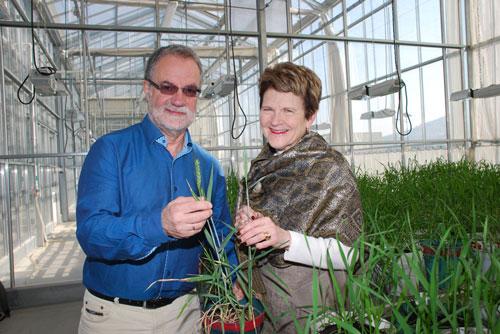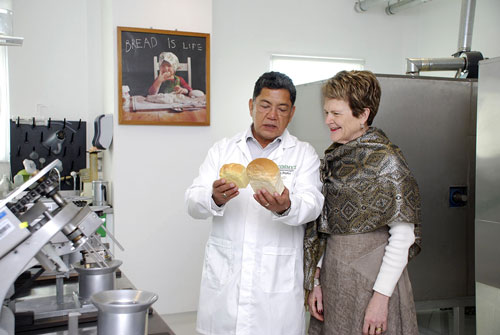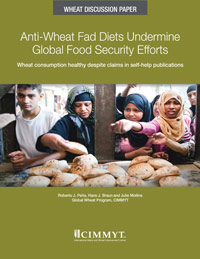‘Gluten-free’ diets put food security, human health at risk – nutritionist

EL BATAN, Mexico (CIMMYT) — Eliminating wheat consumption to avoid ingesting gluten is at best unnecessary for most people and at worst means that diets could lack cereal fiber and other valuable health benefits provided by grains, according to a top nutritionist.
Complete removal of wheat from the human diet would further cripple global efforts to feed the current global population of 7.2 billion, said Julie Miller Jones during a presentation delivered to scientists at CIMMYT on Tuesday.
Despite providing 20 percent of calories consumed globally, wheat and its protein complex, gluten, are often criticized in books and news stories as the cause of many human ailments. However, wheat and grain-based staples provide an array of nutritional and health benefits.
The claim that such non-cereal fibers as those found in fruit, vegetables and legumes can replace cereal fibers has been shown to be untrue, said Miller Jones, who is professor emeritus of nutrition at St. Catherine University in St. Paul, Minnesota.
Eating fibers from a variety of sources plays a role in maintaining healthy cholesterol and blood sugar levels, she said, adding that they also reduce the risk of gut disorders, help maintain healthy gut bacteria and keep unhealthy bacteria at bay.
Abandoning wheat consumption altogether could lead to a reliance on more costly foods, in short supply or impossible to produce on a global scale to meet the dietary needs of a population expected to increase to more than 9 billion by 2050, said Miller Jones.
“Even if we did decide to abandon wheat as a dietary staple, we don’t have the turnaround time, the availability or the quantity of foods that have been recommended as alternatives in anti-gluten fad diets,” she said.
The popularity of gluten-and wheat-free diets has grown largely due to claims published in such books as “Wheat Belly” by William Davis, “Grain Brain” by David Perlmutter and in the news media, asserting that wheat products are the cause of most health problems. Such claims counter current medical and nutritional advice in international dietary guidelines established in conjunction with the Food and Agriculture Organization (FAO) and the World Health Organization (WHO).

“Gluten-free” is a burgeoning industry. Sales have risen 63 percent since 2012, with almost 4,600 products introduced last year, according to “Consumer Reports” magazine.
This is an alarming trend for such nutritionists as Miller Jones, who was also at CIMMYT to discuss the outline for a series of research papers on the various aspects of grain carbohydrates, gluten and health.
“‘Gluten-free’ is actually just another low-carb diet with a hook – any diet that suggests abandoning an entire food group is unhealthy,” said Miller Jones who recommends the DASH diet, which is rich in fruits, vegetables, low fat or non-fat dairy products, whole grains, lean meats, fish, poultry, nuts and beans.
Further reading
CIMMYT Review Paper:
Anti-Wheat Fad Diets Undermine Global Food Security Efforts
